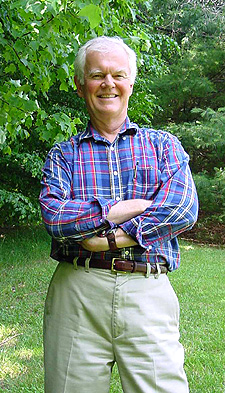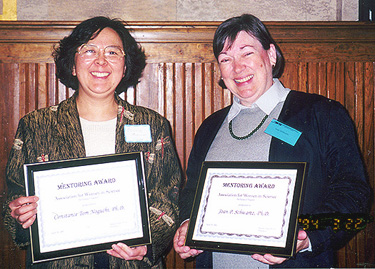
| T H E N I H C A T A L Y S T | J U L Y – A U G U S T 2001 |
|
|
|
FAES: A RUSH TO IMMUNOLOGY (AND MUCH MORE) |
|
 |
|
John
Finerty, chief of the NCI
cellular immunology section, is involved not only in graduate education
but also mentors high school students and elementary school teachers.
|
There’s never an empty space in John Finerty’s course. Since its introduction in 1985, when the the AIDS epidemic was creeping into the public mind and challenging the scientific community, students have rushed to fill Immunology 403, "Basic Principles of Immunology and Hypersensitivity." The demand is so great for this graduate level course that two sections are offered in the fall semester of the FAES (Foundation for Advanced Education in the Sciences) Graduate School at NIH. A one-year advanced immunology course—Immunology 521—is also on deck this fall and has been fully subscribed since its inception as well.
The success of these two courses can be credited to Finerty, who is chair of the FAES Department of Microbiology and Immunology, and to the NIH immunologists who volunteer to lecture on their rapidly evolving field. Immunology 403 is one of the FAES’ "M" courses—approved for continuing medical education credits; it covers such topics as natural immunity, the genetics of and molecular mechanisms in specific immune responses, cellular cooperation, immunodeficiency disease, hypersensitivity, and autoimmunity.
Each year, about 2,000 to 3,000 students enroll in what are now about 200 FAES courses. These offerings sweep the introductory-to-advanced spectrum and keep pace with unfolding topics such as bioinformatics and biomedical ethics law. And the FAES Language Department is the place where new visiting fellows will find courses to help in honing English communication skills. While most classes are conducted in the evenings without laboratory, the BioTrac courses include lecture and laboratory components and are taught during the day.
FAES department chairs are always on the lookout for new instructors and updated course offerings. Those interested in organizing a specific course should contact the appropriate FAES chair or Connie Noguchi, dean of the Graduate School (301-496-1163 or e-mail). A database of postdoctoral fellows interested in teaching is maintained in a Teaching Opportunities for Postdocs online database in cooperation with the NIH Fellows Committee.
The 2001–2002 course
catalog is at the FAES Office (Building 60, Suite 230) and the FAES Bookstore
(Building 10, Room B1-L-101). The last day for mail registration for fall 2001
is August 31. Walk-in registration will
be accepted September 5 to 11 (weekdays
10 a.m.–4 p.m., with added hours from 5–7 p.m. on September 11). Classes
begin September 24. The catalog is also
available online at the FAES website. For
additional information, contact the FAES Office at 301-496-7976. ![]()
.
 |
|
Class
Acts:
(left) Constance
Tom Noguchi, chief of the Molecular
Cell Biology Section, Laboratory of Chemical Biology, NIDDK, and dean
of the FAES Graduate School,
and Joan P.
Schwartz, chief of the Neurotrophic
Factors Section, NINDS, and assistant director of the Office of Intramural
Research, were accorded Awards for Excellence in Mentoring by the Association
for Women in Science, Bethesda chapter.
|